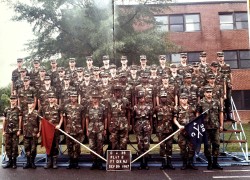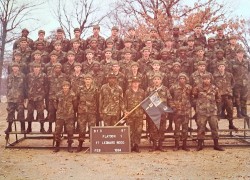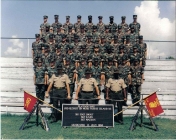Specialty Summary. Deploys, operates and sustains ground and space based satellite, Beyond Line-of-Sight (BLOS) wideband communications, telemetry, and instrumentation systems. Manages and performs design support, installation, calibration, testing, operation, maintenance, and repair of facilities, systems, equipment, and related subsystems. Monitors, analyzes, and directs performance checks and measurements to ensure acceptable performance. Configures equipment. Establishes and maintains communications links with distant terminals. Operates earth terminal control console, and monitors system performance indicators. Implements operational directives. Manages wideband and satellite earth terminal facilities or activities.
Duties and Responsibilities:
Manages satellite systems maintenance activities. Installs and checks operation of wideband and satellite earth terminal communications systems. Manages, installs and checks the operation of instrumentation and telemetry activities. Establishes performance and production standards and work methods. Determines extent and economy of repair for malfunctioning equipment. Recommends methods to improve equipment performance and maintenance procedures. Prepares reports related to operating, installing, repairing, maintaining, and evaluating equipment. Analyzes data printouts and recordings to determine marginal or faulty equipment operation. Evaluates justification and practicability, and recommends corrections to improve equipment performance or maintenance procedures. Assists agencies to conduct research and development projects associated with aerospace systems equipment. Assembles, programs, adjusts, and secures system components. Employs orbiting communication satellite, line-of-sight, and tropospheric scatter techniques. Conducts tests to restore and maintain systems. Uses anti-jam equipment and techniques to neutralize effects of communication jamming. Provides technical and design support assistance, solves problems for test site and operation, and maintenance functions. Develops and enforces safety rules.
Conducts periodic inspections of equipment and facilities to ensure compliance with technical data specifications and timely fulfillment of mission requirements. Interprets survey findings and prescribes corrective action. Serves on or directs inspection teams in evaluating equipment maintenance activities. Interprets deployment orders. Establishes communications links and interconnects communication facilities. Assembles, installs, and operates instrumentation and telemetry systems. Inspects completed assemblies during all phases of static and dynamic testing. Operates instrumentation and telemetry systems comprised of components such as transmitters, recorders, computers, and data conditioning and conversion equipment.
Operates and performs preventive and scheduled maintenance on equipment, to include repairs, overhauls, and modifications. Operates, inspects, adjusts, tunes, and aligns equipment for maximum operating efficiency. Controls preventive maintenance scheduling by coordinating with related control agencies. Evaluates and recommends changes to preventive maintenance routines to provide optimum operational availability and equipment condition. Refers to circuit and cable diagrams to trace circuits. Evaluates equipment performance using test equipment. Disassembles and repairs radar, television, airborne and ground analog and digital telemetry, laser, and timing device components, and other special equipment used for research and development projects. Analyzes equipment limitations, and modifies equipment to increase operational efficiency for specific missions. Reassembles components and calibrates, aligns, and adjusts completed assemblies. Accomplishes tolerance and specification tests. Records and repairs recurring malfunctions.
Manages, inspects, repairs and monitors equipment to determine performance, analyzes data and isolates malfunctions, detects deficiencies, replaces or repairs defective units, and performs corrective alignments. Performs and directs on-the-spot malfunction corrections. Tests repaired units. Removes, repairs, reassembles, reconnects, and performs operational checks. Restore systems to serviceable condition.
Installs and modifies equipment. Designs equipment modifications to meet mission needs. Implements modifications according to configuration directives. Assembles, connects, and inter-wires equipment. Uses layout drawings, schematics, logic diagrams, computer printouts, and technical data to determine installation configuration and analyze operating characteristics. Reviews, evaluates, and resolves deficiencies. Ensures maintenance data collection forms and inspection and maintenance records are completed and accurate.
Specialty Qualifications:
Knowledge. Knowledge is mandatory of application and theory of electronics including solid state components and digital techniques, integrated circuits, transistors, microminiature components, fiberoptics, amplifiers, waveguide components, traveling wave tubes; principles of computers, networks, cryogenics, spread spectrum techniques, and satellite tracking; theory of instrumentation and telemetry systems; pulse and continuous modulation, synchros; servo drives; high power transmission systems and associated environmental control systems; space systems equipment operational procedures; data transmission; orbital mechanics; analog-to-digital and digital-to-analog conversion and hydraulics; data analysis; interpreting publications, blueprints and schematics; communications theory; principles of wideband and satellite earth terminal systems and equipment, and their operational procedures; satellite orbital mechanics; test equipment and circuit analysis; principles of multiplexing, digital data transmission; networks associated with multichannel equipment; installing and testing practices; atomic frequency generating devices; voice and data communication equipment including Defense Information Systems Agency technical and satellite control and testing procedures and interpretation of technical data; military specifications and standards; and Air Force maintenance management and supply procedures; application of mathematics, including algebraic formulas and physics to instrumentation and telemetry systems.
Education. For entry into this specialty, completion of high school with courses in geometry, trigonometry, algebra, and physics is desirable.
Training. Completion of the following training is mandatory for award of the AFSC indicated:
2E131. A basic satellite, wideband and telemetry systems course.
2E171. The communications-electronics career advancement course.
Experience. The following experience is mandatory for award of the AFSC indicated:
2E151. Qualification in and possession of AFSC 2E131. Also, experience in functions such as analyzing, testing, calibrating, or maintaining satellite systems equipment, assembly, installation, repair, modification, and operation of instrumentation and telemetry systems; adjusting and calibrating instrumentation components; replacing defective parts; or repairing faulty components; installing, maintaining, repairing, modifying or operating wideband and satellite earth terminal communications systems.
2E171. Qualification in and possession of AFSC 2E151. Also, experience performing or supervising satellite systems maintenance, instrumentation and telemetry systems, or wideband and satellite earth terminal communications systems. Also, experience in performing or supervising functions such as: assembly, installation, repair, modification, and operation of instrumentation and telemetry systems; repairing test equipment; adjusting and calibrating instrumentation components; replacing defective parts; or repairing faulty components.
Other. The following are mandatory as indicated: For entry into this specialty, the following are mandatory: Normal color vision as defined in AFI 48-123, Medical Examinations and Standards. For award and retention the following is mandatory: Specialty requires routine access to Secret material or similar environment. For award and retention of AFSCs 2E1X1, completion of a current National Agency Check, Local Agency Checks and Credit (NACLC) according to AFI 31‑501, Personnel Security Program Management. NOTE: Award of the 3-skill level without a completed NACLC is authorized provided an interim Secret security clearance has been granted according to AFI 31-501. 3.5.2.2. For award and retention of AFSCs 2E151/71, must maintain an Air Force Network License according to AFI 33‑115, Vol 2, Licensing Network Users and Certifying Network Professionals.




